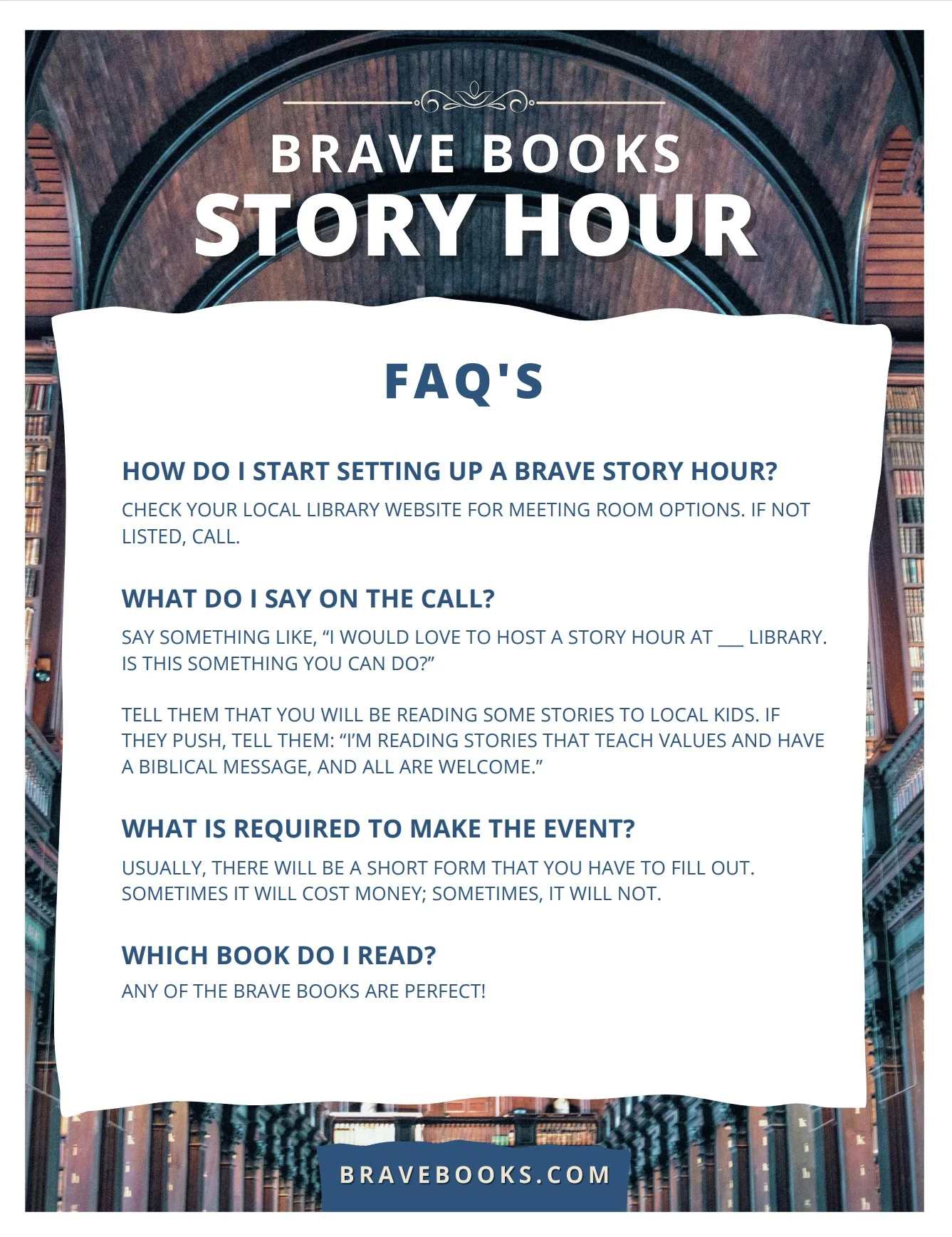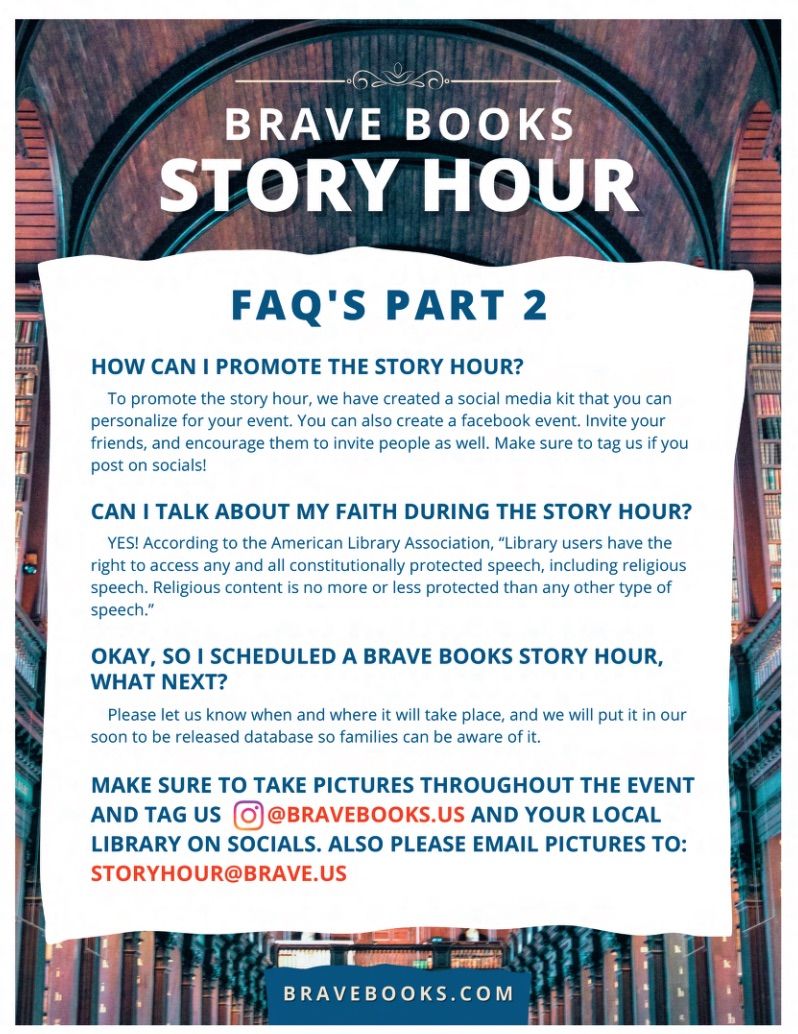Former child actor turned right-wing political darling and author Kirk Cameron and publisher Brave Books are planning public library events August 5 across the country. They’re calling on supporters to begin planning for these public events in order to “pray, sing, and read BRAVE Books and other books of virtue.” Imagine, they note, filling public libraries across the country with friends, family, pastors, and “your teachers” to turn the nation “back to God.”
The event aims to stoke the moral panic around public institutions like libraries no longer honoring “viewpoints that are foundational, time-honored, and true” in favor of “the more radical.”


Cameron has become a name among public librarians since late 2022. After being “denied” access to several public libraries, Cameron took to the media to claim discrimination, then victory, once he secured space in several U.S. public libraries to hold his own story time.
The story is, of course, more complicated.
Cameron, who published Pride Comes Before The Fall, did so through Brave Books, a publisher whose goals are to progress pro-God and pro-America agenda through their books written and marketed for children. Brave Books launched in July 2021, and their “about” notes:
There is an agenda to confuse and demoralize our children and make them hate their country and the values that it was founded upon.
To us, it felt like a one-sided battle. That’s why BRAVE Books created an alternative to the current progressive agenda dominating children’s literature. Each book teaches a new traditional value that makes America so special. With the universe and cast of characters we have created as well as the BRAVE Challenges, we are creating a one-of-a-kind learning experience woven into an epic adventure that will live forever in your children’s hearts and minds.
Brave Books’s slate of titles aim to express a right-wing ideology, and each is written by a star within conservative circles. Among the titles are Little Lives Matter, Elephants Are Not Birds, and Unmuzzle Me, Please. Cameron has published two books with the company, and each has come with a “book tour” of story times in public libraries.
Public libraries often offer study spaces and program rooms for individuals to reserve; for the sake of simplicity, they’re often referred to as meeting rooms. In some libraries, the reservations are limited to those with library cards and in others, they’re open on a first-come, first-served basis. It is common that library-created programs take precedence over outside use. A teen program created and sponsored by the library would have priority to use a meeting room over someone outside the organization.
Over the years, meeting room policies have become hot topics in the world of libraries. Can anyone reserve one? Can limits be placed on the kinds of people who have the right to use them? What sorts of uses are protected and which aren’t? These questions all have merit and value, especially when it comes to considering how taxpayer money is being used. A for-profit business setting up an event in the public library meeting room may be in direct conflict with the values of the public library. Libraries articulate that the use of meeting room spaces does not imply library approval or sponsorship; groups cannot in their marketing or advertising note that it is a program being held by the library nor coordinated by it.
This is where the Cameron story sits.
For the release of his first title with Brave Books, the publisher and publisher’s marketing company Amplifi Agency attempted to rent rooms at several public libraries. They claim over 50 public libraries denied their offer to host story times. But this wasn’t true. Scarsdale Library in New York explained what happened: Cameron, Brave Books, and Amplifi thought they were above the policy and ignored the formal process for using a room.
Cameron then claimed victory when he successfully rented rooms at other public libraries. Among them were the Sumner Public Library in Tennessee, where the director was fired for “unkind pushback,” and the Indianapolis Public Library, where he was initially denied. Cameron claimed the denial happened because of his race and the messages in his book; the truth is, of course, far more complicated and related to policies that he and his team chose to ignore.
In May, Seattle Public Library rented a meeting room to Cameron as well. They clarify precisely what is being spun by right-wing media as owning the “marxist public library”:
Brave Books has held similar events with Cameron at other libraries around the country, and some of these events have generated public confusion about the difference between library-sponsored programs and library meeting room bookings made by groups or individuals.
There is an important difference:
Library-sponsored programs are created and developed by Library staff, often in collaboration or co-design with community or other partner agencies, and they are intended to reflect community interest, meet community needs, and align with Library values.
Meeting rooms, however, are provided as a public service that is open and available to everyone equally. We do not choose who gets to use our meeting rooms or what they are allowed to say or believe. That would be government censorship and a violation of the First Amendment.
The Library is committed to intellectual freedom, which we believe is essential to a healthy democracy, even when viewpoints expressed do not align with Library values. We have heard from some in the community asking why the Library is allowing this booking, citing the author’s views on abortion, LGBTQ+ rights, and more. Censoring these viewpoints is counter to Library policy and the associated laws that ensure intellectual freedom for all people.
More, they add:
The Seattle Public Library cannot hold this belief only when it is politically convenient – intellectual freedom must be made available to all, consistently, in a free and democratic society.
Because these spaces are made available to the public for private use, the Library does not endorse or sponsor private events or the viewpoints expressed at the events. We will, however, coordinate with event organizers and other public agencies as needed to ensure the event is managed well.
Seattle Public Library’s messaging is, of course, in direct contrast to what Cameron and Brave Books claim. The library made their room available and put the onus of safety onto the users, as it should be. As any institution upholding the First Amendment does, they made clear that the space can — and indeed, should — be a place for an exchange of varying ideas.
What gets tricky and is worth emphasizing here is when the Freedom of Speech butts heads against Freedom of Religion and more, where both intersect with the Separation of Church and State. This is why libraries emphasize that groups are responsible for their events and why it is they cannot suggest the library is hosting, sponsoring, or in any way connected to it.
So the August 5 events being mass-coordinated by anyone who wishes to set up a story time at their local public library are a ripe opportunity for all of these elements to clash and for right-wing “activists” to proclaim they’re being discriminated against by a taxpayer institution. Brave Books has developed a resource kit for anyone wishing to put together one of these story times, and they have set up a map for people to drop pins for confirmed events. Doing this inevitably connects the public libraries with Brave Books, and given how few people know the actual intricacies behind library policy — and indeed, with people of this particular persuasion not wanting to care about them — the flames are about to grow hotter.
If you’re a public library worker, now is the time to prepare for what could be either an onslaught or a big nothing burger. In hoping for the latter, preparing for the former will ensure that your library is indeed in a strong position to defend the choices it makes in the interest of its purpose, its staff, and its users. This includes reviewing your policies around meeting rooms and meeting with your legal representation on what requirements you can and cannot make of those requesting rooms (specifically around security — someone like Cameron, via his profile, is a public safety concern but also, knowing that increased law enforcement at the public library is antithetical to the tenants of librarianship and is an impediment for the use of the facility by marginalized individuals, what do you do?).
Take the time to talk with staff about responding to inquires about hosting events such as these and make sure everyone is on the same page. Prepare public statements to address questions and concerns which may arise, too: the statements above by both Scarsdale and Seattle Public Libraries are excellent public relations but more, they’re outstanding examples of libraries being institutions dedicated to facts and transparency.
It might also be worth your time to make sure all levels of library worker knows what’s at stake right now in institutions like them. These are coordinated efforts to prove a point; in the sake of Cameron and Brave Books, it’s to find a “gotcha” with censorship. If you don’t give them what they want, they can cry censorship, even if they themselves are the perpetrators who purposefully subvert the rules and policies.
As we’ve seen throughout the country, truth does not matter to those bent on their messaging and their right-wing values of authoritarianism. But your institution can continue to be a bastion of light by upholding your standards and policies, advocating for First Amendment Rights of all — not just those with the most money and political sway — and you can continue to educate your patrons about why some books get purchased and included in the collection while others, like those published by Brave Books, do not.
Failing to do these things only bolsters the argument that libraries are a drain on public resources and encourages further book bans, programming under false pretenses, and unmitigated attacks on one of the only institutions in the country which serves as a “third place,” without any consumerist or capitalist expectations, to anyone who would like to use it.
Cameron and Brave Books do not have good intentions with this. They have ideological plans and the support of well-connected right-wing media.
Libraries deserve better, but resting on the laurels of public perceptions won’t be enough to save them.
